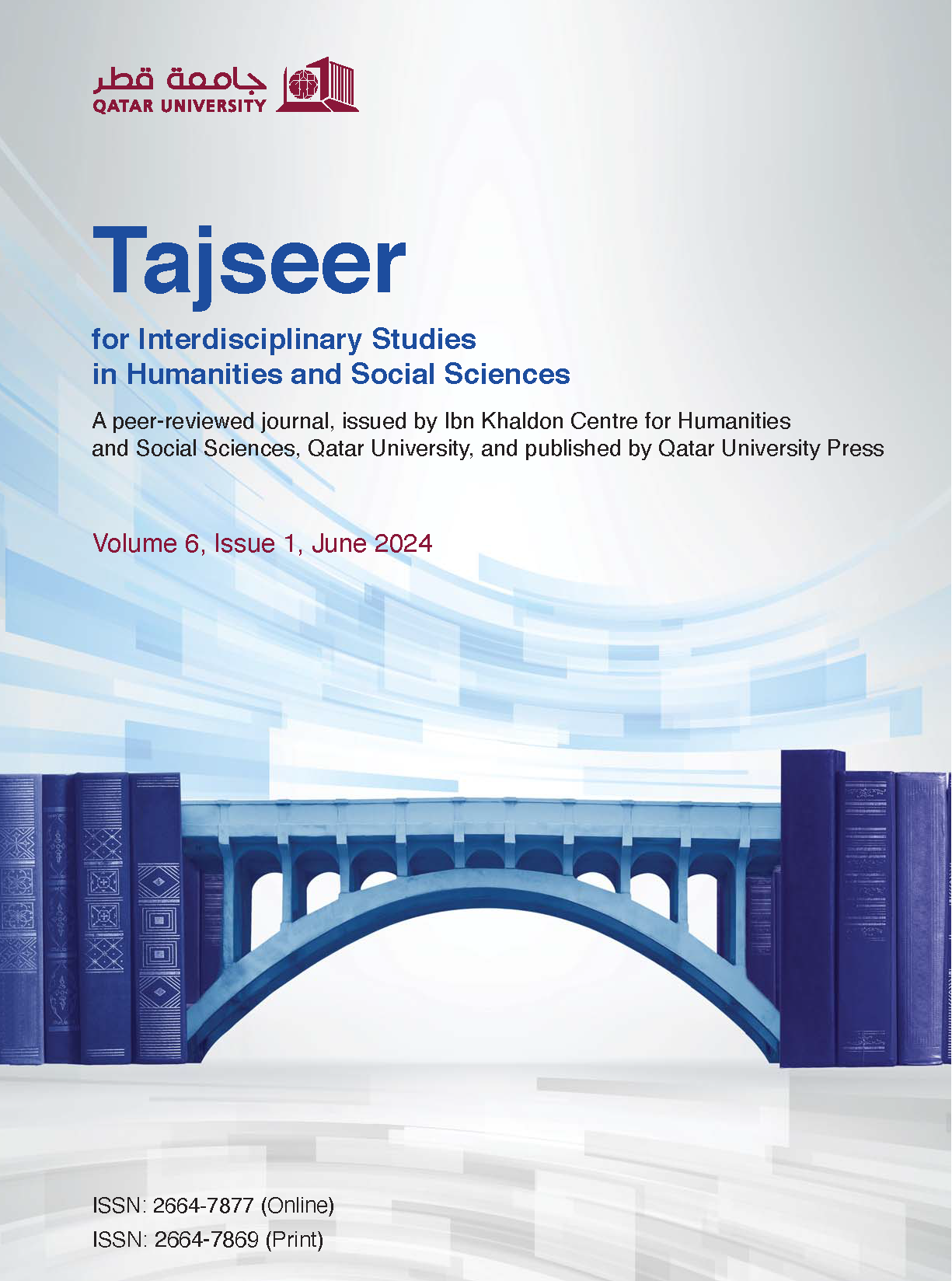The Intersection of Poetry and Sufism in Mikhail Naimy’s Divan Hams Al-jufun
Abstract
This study seeks to show the intersection between poetry and mysticismin Mikhail Naimy’s Hams al-jufun divan as this poet founded a unique experience which is sourced by the spiritual consciousness that leads to the truth that hides behind the phenomena. This is perhaps the secret that has led me to look for the intersection of poetry and mysticism that both of which aim at the inner and seek to fuel and sensitize emotions, and make them capable of love, sensation and interaction with existence and its things. This study was based on the central conception that spiritual freedom is a choice to which Mikhail Naimy turned in order to establish a poetical philosophy beyond aesthetic and art to reach to value and spirituality. This led his poetry to become contingent on an inner vision that achieves organic unity within the poems of the divan, and establishes the concept of spiritual beauty that derives its components from creative imagination. The study concludes that poetry and mysticism are manifestations of Mikhail Naimy's spiritual consciousness.
Metrics
##plugins.themes.bootstrap3.article.details##
Poetic visionmystical consciousnessspiritual emotionmoral perfectionHams al-jufūn Divan
Al-Ghazālī, AbūḤāmid. Iḥyāʼʻulūm al-Dīn, (in Arabic). taḥqīq Abī Ḥafṣ Sayyid ibn Ibrāhīm ibn Ṣādiq ibn ʻUmrān, Al-Qāhirah: Dār al-ḥadīth, 1988.
Al-Marzūqī, AbūYaʻrub. Fī al-ʻalāqahbayna al-shiʻr al-Muṭlaqwa-al-iʻjāz al-Qurʼānī. (in Arabic). Bayrūt: Dār al-Ṭalīʻah, 1st ed., 2000.
Al-Sayyid, Shafīʻ. Mīkhāʼīl Naʻīmah: manhajuhufī al-naqd wātjāhh fī al-adab. (in Arabic). Al-Qāhirah: ʻĀlam al-Kutub, 1972.
Biniʻmārah, Muḥammad. al-Ṣūfīyahfī al-shiʻr al-Maghribī al-muʻāṣir (al-mafāhīmwa al-tajallīyāt). (in Arabic). Al-Dār al-Bayḍāʼ: Sharikat al-Nashrwa-al-Tawzīʻ-al-Madāris, 1st ed., 2000.
Corbin, Hinrī. al-Khayyāl al-Khallāq fī Taṣawwuf Ibn ʻArabī, (in Arabic). trans Farīd al-Zāhī. Al-Rabāṭ: ManshūrātMarsam, 2nd ed., 2006.
DīwānImriʼ al-Qays, (in Arabic). taḥqīq Muḥammad Abū al-Faḍl Ibrāhīm. Miṣr: Dār al-Maʻārif, 5th ed., [N.D].
Ibn ʻArabī, Muḥyī al-Dīn. al-anwār fīmā ymnḥ ṣāḥib al-khalwah min al-asrār, (in Arabic). taqdīm ʻAbd al-Raḥmān Ḥasan Maḥmūd. al-Qāhirah: Maktabat ʻĀlam al-Fikr, 1st ed., 1986.
Ibn manẓūr, Jamāl al-Dīn Muḥammad al-Miṣrī, Lisān al-ʻArab, (in Arabic). taṣḥīḥ: Amīn Muḥammad ʻAbd al-Wahhāb, wa-Muḥammad al-Ṣādiq al-ʻUbaydī. Bayrūt: DārIḥyāʼ al-Turāth al-ʻArabī, 1999.
Malḥas, Thurayyā ʻAbd al-Fattāḥ. Al-Qayyim al-rūḥīyahfī al-shiʻr al-ʻArabī qadīmuhu wa-ḥadīthuhu (ḥattá muntaṣaf al-qarn al-ʻishrīn). (in Arabic). Bayrūt: Dār al-Kitāb al-Lubnānī, 1965.
Mandūr, Muḥammad. Fī al-adabwa-al-naqd. (in Arabic). AL-Qāhirah: Nahḍat Miṣr, 1988.
Naʻīmah, Mīkhāʼīl. Al-Bayādir. (in Arabic). Bayrūt: Dār Nawfal lil-Nashrwa-al-Tawzīʻ, 12th ed., 1992.
–––. Al-ghurbāl. (in Arabic). Lubnān: Dār Nawfal lil-Nashrwa-al-Tawzīʻ, 15th ed., 1991.
–––. Al-Majmūʻah al-kāmilah li-aʻmālNaʻīmah, (in Arabic). B3. Bayrūt: Dār al-ʻIlm lil-Malāyīn, 3rd ed., 1987.
–––. Al-marāḥil. (in Arabic). Bayrūt: Muʼassasat Nawfal, 9th ed., 1989.
–––. al-Nūrwāldyjwr. (in Arabic). Bayrūt: Muʼassasat Nawfal, 7th ed., 1988.
–––. Alʼwthān. (inArabic) Bayrūt: Muʼassasat Nawfal, 7th ed., 1978.
–––. fīmahabb al-rīḥ. (inArabic) Bayrūt: Maktabat Ṣādir, 1953.
–––. Hams aljfwn. (inArabic) Bayrūt: Maktabat Ṣādir, 2nd ed., 1952.
–––. Zād al-maʻād. (inArabic) Miṣr: Maṭbaʻat al-Muqtaṭaf wa-al-Muqaṭṭam, 1936.
Sulṭān, Wafīq. Al-shiʻr wa-al-taṣawwuf. (in Arabic). Sūriyā: Dār al-Ḥiwār lil-Nashrwa-al-Tawzīʻ, 1st ed., 2013.
Surūr, ṬāhāʻAbd al-Bāqī. Min Aʻlām al-taṣawwuf al-Islāmī, (in Arabic), B1. Al-Qāhirah: Nahḍat Miṣr, 1956.
*********************************************************************************************************
ابن عربي، محيي الدين. الأنوار فيما يمنح صاحب الخلوة من الأسرار، تقديم عبد الرحمن حسن محمود. القاهرة: مكتبة عالم الفكر، ط1، 1986م.
ابن منظور، جمال الدين محمد المصري، لسان العرب، تصحيح: أمين محمد عبد الوهاب، ومحمد الصادق العبيدي. بيروت: دار إحياء التراث العربي، 1999.
بنعمارة، محمد. الصوفية في الشعر المغربي المعاصر (المفاهيم والتجليات). الدار البيضاء: شركة النشر والتوزيع – المدارس، ط1، 2000م.
ديوان امرئ القيس، تحقيق محمد أبو الفضل إبراهيم. مصر: دار المعارف، ط5. [د.ت].
سرور، طه عبد الباقي. من أعلام التصوف الإسلامي. القاهرة: نهضة مصر،1956م.
سلطان، وفيق. الشعر والتصوف. سوريا: دار الحوار للنشر والتوزيع، ط1، 2013م.
السيد، شفيع. ميخائيل نعيمة: منهجه في النقد واتجاهه في الأدب. القاهرة: عالم الكتب، 1972م.
عباس، إحسان. ونجم، محمد يوسف. الشعر العربي في المهجر: أمريكا الشمالية. بيروت: دار صادر، ط2، 1967م.
الغزالي، أبو حامد. إحياء علوم الدين، تحقيق أبي حفص سيد بن إبراهيم بن صادق بن عمران. القاهرة: دار الحديث، 1988م.
كوربان، هنري. الخيال الخلاق في تصوف ابن عربي، ترجمة فريد الزاهي. الرباط: منشورات مرسم، ط2، 2006م.
المرزوقي، أبو يعرب. في العلاقة بين الشعر المطلق والإعجاز القرآني. بيروت: دار الطليعة، ط1، 2000م.
ملحس، ثريا عبد الفتاح. القيم الروحية في الشعر العربي قديمه وحديثه (حتى منتصف القرن العشرين). بيروت: دار الكتاب اللبناني،1965م.
مندور، محمد. في الأدب والنقد. القاهرة: نهضة مصر، 1988م.
نعيمة، مخائيل. الأوثان. بيروت: مؤسسة نوفل، ط7، 1978م.
–––. البيادر. بيروت: دار نوفل للنشر والتوزيع، ط12، 1992.
–––. زاد المعاد. مصر: مطبعة المقتطف والمقطم، 1936.
–––. الغربال. لبنان: دار نوفل للنشر والتوزيع، ط15، 1991.
–––. في مهب الريح. بيروت: مكتبة صادر، 1953م.
–––. المجموعة الكاملة لأعمال نعيمة، بيروت: دار العلم للملايين، ط3، 1987م.
–––. المراحل. بيروت: مؤسسة نوفل، ط9، 1989م.
–––. النور والديجور. بيروت: مؤسسة نوفل، ط7، 1988م.
–––. همس الجفون. بيروت: مكتبة صادر، ط2، 1952م.



 https://orcid.org/0009-0006-5788-6481
https://orcid.org/0009-0006-5788-6481